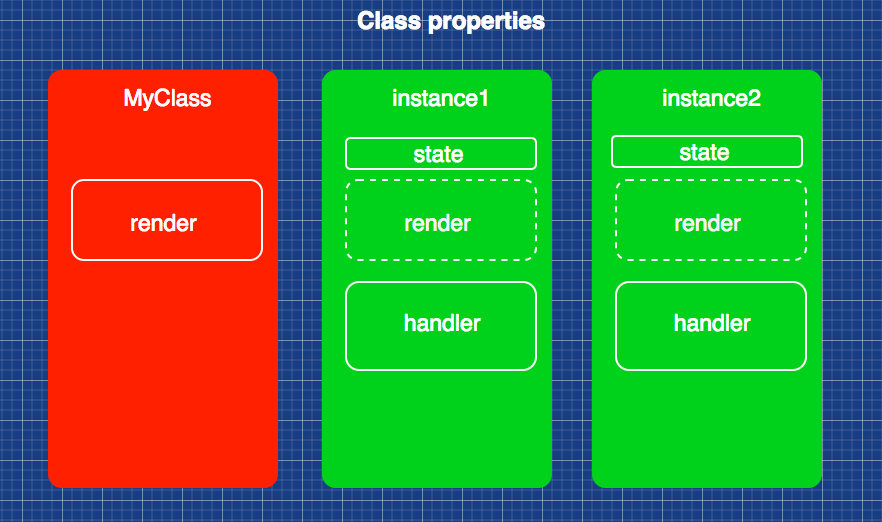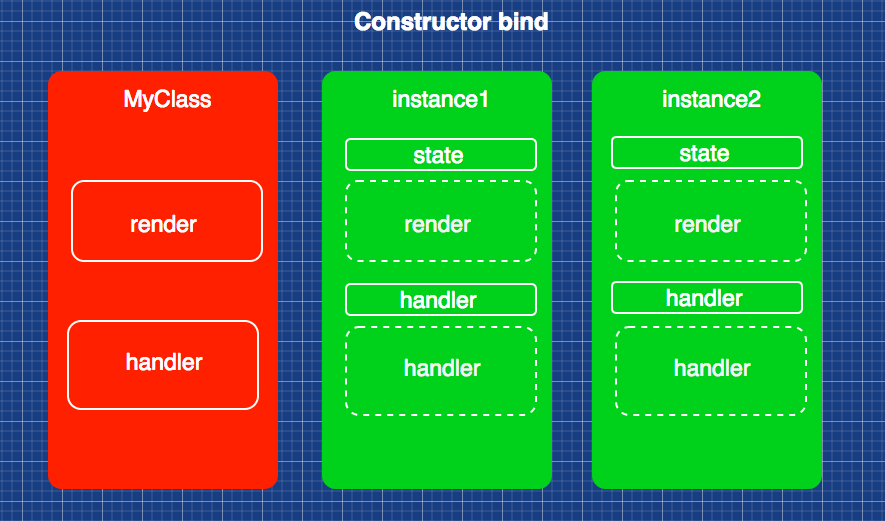
技术咨询、项目合作、广告投放、简历咨询、技术文档下载
点击这里 联系博主
# React中使用bind函数和箭头函数效率比较
# sidebar: false
提问:react项目中的JSX里,在constructor中使用this.func=this.func.bind(this)的写法,为什么要比非bind的func = () => {}的写法效率高?
使用构造函数绑定例子
class Test extends Component {
constrcutor() {
this.handleClick = this.handleClick.bind(this)
}
handleClick() {
console.log(this)
}
render() {
return <Button onClick={this.handleClick}>测试</Button>
}
}
使用箭头函数方式
class Test extends Component {
handleClick = () => {
console.log(this)
}
render() {
return <button onClick={this.handleClick}>测试</button>
}
}
使用箭头函数方式比构造函数绑定方式的优点:
- 不需要手动编写bind函数,减少代码量;
为何构造函数绑定方式性能要高呢?
首先看一下bind的polyfill:
if (!Function.prototype.bind) {
Function.prototype.bind = function(oThis) {//oThis为需要绑定的对象也就是上例中的{a:20}
// this为上例中的bFun,要求必须为函数类型
if (typeof this !== 'function') {
// closest thing possible to the ECMAScript 5
// internal IsCallable function
throw new TypeError('Function.prototype.bind - what is trying to be bound is not callable');
}
//将bind函数传入的参数从第1个(index从0开始)开始转换成数组,因为第0个为传入的绑定对象。arguments为类数组
var aArgs = Array.prototype.slice.call(arguments, 1),
fToBind = this,
fNOP = function() {},
fBound = function() {
// this instanceof fBound === true时,说明返回的fBound被当做new的构造函数调用
// 由于使用new 方式创建的对象,this指向为对象的实例,此处判断如果使用new方式创建那么this应该为对象实例的this
// 否则使用上下文绑定为传入的对象
return fToBind.apply(this instanceof fBound
? this
: oThis,
// 获取调用时(fBound)的传参.bind 返回的函数入参往往是这么传递的
// 函数的参数:应该为bind时传入的参数+调用生成的函数时传入的参数和
aArgs.concat(Array.prototype.slice.call(arguments)));
};
// 维护原型关系
if (this.prototype) {
// Function.prototype doesn't have a prototype property
fNOP.prototype = this.prototype;
}
// 下行的代码使fBound.prototype是fNOP的实例,因此
// 返回的fBound若作为new的构造函数,new生成的新对象作为this传入fBound,新对象的__proto__就是fNOP的实例
fBound.prototype = new fNOP();
return fBound;
};
}
原因
通过在构造器中使用bind绑定函数以后,所生成的实例中,都会有一个独立的fBound,函数体相对于待绑定的函数较小,而每个实例中的fBound在被调用时都会共享待绑定的函数handleClick.也就是说:
使用构造器bind的方法,每个实例都可以有效地共享函数体,从而更加有效的使用内存。然后使用箭头方式绑定,所生成的实例中都有一个单独的handleClick
二者使用场景
- 当函数不做复杂逻辑处理,使用构造函数绑定和箭头函数方式绑定区别不大;
- 当实例数量比较少或者需要绑定的函数较少情况;使用箭头函数更容易理解;
- 实例数量比较多或者函数有复杂逻辑处理,请使用构造函数绑定方式。
盗用Demystifying Memory Usage using ES6 React Classes (opens new window)中的两张区别图。
箭头函数方式:每个实例都会创建一个新的handler函数

构造函数方式:每个实例会创建一个较小的函数(也就是bind中返回的fBound),并复用handler函数

